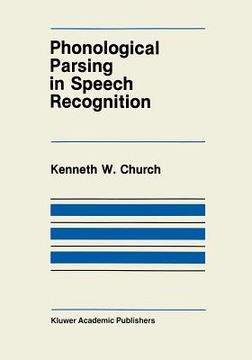Compartir
Phonological Parsing in Speech Recognition (en Inglés)
K. Church
(Autor)
·
Springer
· Tapa Blanda
Phonological Parsing in Speech Recognition (en Inglés) - Church, K.
S/ 506,54
S/ 1.013,08
Ahorras: S/ 506,54
Elige la lista en la que quieres agregar tu producto o crea una nueva lista
✓ Producto agregado correctamente a la lista de deseos.
Ir a Mis Listas
Origen: Estados Unidos
(Costos de importación incluídos en el precio)
Se enviará desde nuestra bodega entre el
Martes 23 de Julio y el
Jueves 01 de Agosto.
Lo recibirás en cualquier lugar de Perú entre 2 y 5 días hábiles luego del envío.
Reseña del libro "Phonological Parsing in Speech Recognition (en Inglés)"
It is well-known that phonemes have different acoustic realizations depending on the context. Thus, for example, the phoneme /t! is typically realized with a heavily aspirated strong burst at the beginning of a syllable as in the word Tom, but without a burst at the end of a syllable in a word like cat. Variation such as this is often considered to be problematic for speech recogni- tion: (1) "In most systems for sentence recognition, such modifications must be viewed as a kind of 'noise' that makes it more difficult to hypothesize lexical candidates given an in- put phonetic transcription. To see that this must be the case, we note that each phonological rule [in a certain example] results in irreversible ambiguity-the phonological rule does not have a unique inverse that could be used to recover the underlying phonemic representation for a lexical item. For example, . . . schwa vowels could be the first vowel in a word like 'about' or the surface realization of almost any English vowel appearing in a sufficiently destressed word. The tongue flap [(] could have come from a /t! or a /d/. " [65, pp. 548-549] This view of allophonic variation is representative of much of the speech recognition literature, especially during the late 1970's. One can find similar statements by Cole and Jakimik [22] and by Jelinek [50].
- 0% (0)
- 0% (0)
- 0% (0)
- 0% (0)
- 0% (0)
Todos los libros de nuestro catálogo son Originales.
El libro está escrito en Inglés.
La encuadernación de esta edición es Tapa Blanda.
✓ Producto agregado correctamente al carro, Ir a Pagar.

